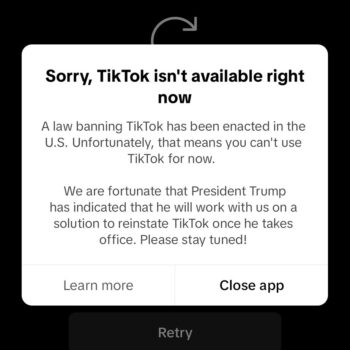
In its message declaring the platform unavailable, TikTok played to Donald Trump’s vanity by saying it was “fortunate” to have his assistance.
So here we are. After both houses of Congress approved it, the president signed it and government attorneys successfully argued for it in federal court, the ban on TikTok went into effect for a few hours, which for some might have seemed like an eternity.
The law bans the social media platform used by 170 million Americans unless its Chinese parent company, ByteDance, sells it. While the ban took effect the day before Donald Trump’s presidential inauguration, the site was restored as Trump vowed to extend the app’s life by 90 days (AP, 1/19/25).
I have covered the move to ban TikTok for years (FAIR.org, 8/5/20, 5/25/23, 11/13/23, 3/14/24, 9/27/24), so I’ll summarize the problem: Anti-China hysteria (and Israel boosterism) led lawmakers in both parties to allege that TikTok harvests user data—which sounds sinister, but is actually par for the course with social media. A ban would hurt millions of people who rely on the app for their personal business and for news consumption, and would set a terrible anti–free speech precedent, forcing us all to ask what other foreign-owned media products could also face federal censorship.
Commercial realities
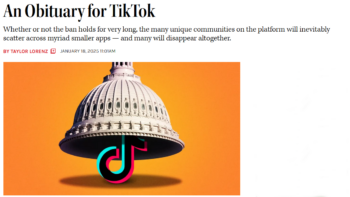
For the Hollywood Reporter (1/18/25), what made TikTok unique was that it “allowed any user, regardless of their social clout or level of fame, to reach millions at the click of the button.”
While many have rightfully protested the ban, it surely wasn’t any left-wing outcry that has caused Trump, who originally started the anti-TikTok sentiment (NPR, 8/6/20), to attempt to save the app’s life in the US.
Shutting down the platform would negatively impact a number of important US business sectors, including the music industry (Guardian, 1/18/25) and advertising (Adweek, 1/3/25). Small businesses, often lauded as the purest form of American entrepreneurialism in the conservative imagination, are acutely at risk (CBS News, 1/17/25); imagine upstart companies several decades ago losing their phone or mail service.
As the Hollywood Reporter (1/18/25) noted:
By 2023, TikTok was playing a major role in our economy. Thousands of retailers came to rely on TikTok Shop to reach customers, and by the following year TikTok was just as much of an ecommerce platform as a social network. TikTok claims it contributed $24.2 billion to the GDP in 2023, and supported some 224,000 American jobs, according to Oxford Economics, a research firm.
The state wanted to curb people’s access to Chinese apps, yet the ban fails to do that, as many TikTok users flocked to another Chinese app, RedNote (Global Times, 1/14/25; Slate, 1/16/25). (The right has alleged, with little or no evidence, that TikTok is used to advance Chinese state ideology—Fox News, 7/31/23; Free Press, 1/5/25).
‘Warm spot’ for TikTok
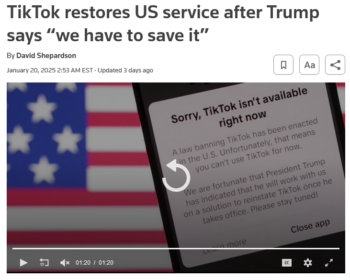
TikTok restored service on January 20 (Reuters, 1/20/25), but as of January 23, the app was still unavailable from Google and Apple‘s app stores.
Trump, ever the vain showman, found his own success on the app (Reuters, 6/3/24). “Trump has said he has a ‘warm spot’ for TikTok and has vowed to ‘save’ a platform on which his campaign generated ‘billions of views,’” reported USA Today (1/15/25). TikTok’s CEO is feeding Trump’s ego at an opportune time in hopes that Trump could save the app (Washington Post, 1/16/25).
Others on the right are seeing the problems with banning TikTok. The Murdoch-owned New York Post (1/18/25) ran an op-ed saying, “just because the anti-TikTok legislation is legal”—the word the authors are looking for is constitutional, not legal, but you get the idea—“doesn’t necessarily make it wise.” It reminded readers, “We must also grapple with an uncomfortable truth: Despite its Chinese Communist ties, TikTok became an unlikely bastion of free speech during the 2024 election season”—in contrast to “Meta’s Orwellian content moderation.”
Former GOP Wisconsin Rep. Mike Gallagher, a key architect of the ban, took to the Wall Street Journal (1/9/25), also Murdoch-owned, to defend the ban in a piece called “Congress Didn’t Ban TikTok,” which smelled more like last-minute damage control than a policy victory lap.
In other words, after federal lawmakers spent hours pushing through the ban and arguing for it in media outlets, and lawyers used precious resources to craft careful arguments in the court, it was all a waste of time.
TikTok could still go dark
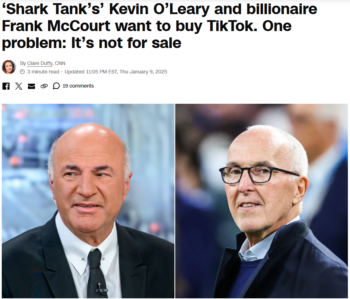
Some US investors who hope to take over TikTok in a gun-to-the-head sale say that they don’t need to buy the algorithm—a claim some social media observers find dubious (CNN, 1/9/25).
But free speech advocates shouldn’t celebrate just yet. First of all, this could very well be merely a delay in a ban, rather than long-term preservation of the platform. TikTok could very well go dark eventually.
Meanwhile, Elon Musk, whose acquisition of Twitter (now known as X) has crushed free speech on that platform (El País, 5/24/23), created a cesspool of bigotry (Rolling Stone, 1/24/24; Guardian, 9/5/24) precipitated the site’s overall decline (Nieman Reports, 1/31/24; CNN, 9/5/24; NBC News, 11/13/24), is a potential buyer for TikTok (Bloomberg, 1/14/25). Such a move would consolidate social media under far-right billionaire control.
On Trump’s own social media network, Truth Social (1/19/25), Trump said of a future deal to save TikTok: “I would like the United States to have a 50% ownership position in a joint venture. By doing this, we save TikTok, keep it in good hands and allow it to stay up.” Translation: state control. As is always the case with Trump, it’s hard to say how much he believes this.
Many believe it is unlikely ByteDance would spin off TikTok to another party. “ByteDance would prefer to shut down TikTok rather than sell it if the Chinese company exhausts all legal options,” Reuters (4/26/24) reported, citing several sources, as this would be tantamount to selling its trade secrets to rivals. It would also be
impossible to divest TikTok with its algorithms, as their intellectual property license is registered under ByteDance in China and thus difficult to disentangle from the parent company.
“Separating the algorithms from TikTok’s US assets would be an extremely complicated procedure,” Reuters said.
Power to censor
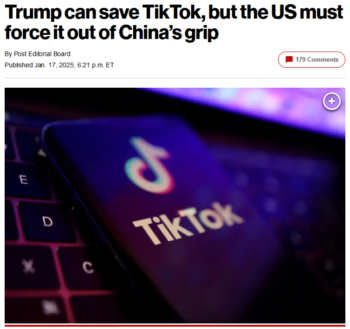
Putting the lie to the Supreme Court’s claim that the anti-TikTok law was “content agnostic, the New York Post (1/17/25) pointed to the platform’s “enormous potential to sway public opinion” as a “prime reason” to force a takeover.
The bipartisan ban on TikTok impacts any app with ties to its Chinese company ByteDance, so other less popular apps, like the video editor CapCut, are also feeling the pinch (USA Today, 1/19/25). The ban’s power to censor is still very much in effect.
Even if Trump simply chooses not to enforce the ban against TikTok, the law remains on the books, and the Supreme Court has provided politicians with judicial justification that free speech concerns can be subverted if you say the words “national security” and “foreign adversary” enough times (New York Times, 1/17/25). With journalists already fearing how Trump might retaliate against the press (FAIR.org, 11/14/24), this Supreme Court precedent will be another legal arrow in the executive branch’s quiver.
RedNote’s popularity has already put it in the crosshairs of the national security state. CBS News (1/16/25) reported that an unnamed US official said “RedNote, just like TikTok, could face an ultimatum to divest, or be banned.” Capitalizing on US government anxiety about RedNote, the Global Times (1/17/25), owned by China’s Communist Party, said, “Those malicious hypes won’t deter the momentum of positive engagement between Chinese and the US netizens.” It’s a cheeky little jab at anti-China demagogues, but that attitude could only encourage more US censorship of anything deemed in control of Beijing.
The lesson of this episode is that jingoistic paranoia is a dangerous disease. The New York Post editorial board (1/17/25), as if channeling George C. Scott in Dr. Strangelove, said the US “must not kowtow to the commies and let China retain control of the company or its app.” The Post and other Trumpists clearly want Washington to snatch TikTok from ByteDance to kick dirt in China’s face in a would-be show of hegemonic dominance.
More tariffs, and war talk about so-called Chinese control of the Panama Canal, have negative consequences for everyday Americans (CounterSpin, 1/10/25). For example, the impending tariffs on Mexico, Canada and China could mean higher prices for consumers (CNBC, 1/20/25), especially for generic drugs (NBC News, 11/22/24), and they could alienate the US from global cooperation to “improve the resilience of supply chains, decarbonize production patterns, or increase workers’ rights” (Center for American Progress, 12/18/24).
And, of course, one of the prime victims of anti-Communist fervor has always been free speech; think HUAC and McCarthyism. TikTok has a little more time, and could remain a media service for millions of Americans after all, but the battle to defend free speech under the second Trump administration is just beginning.
This post was originally published on here







